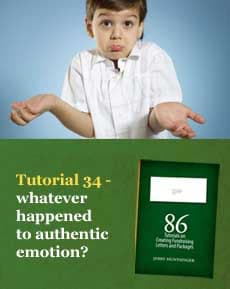Tutorial 34: Whatever happened to authentic emotion?
Once in a while, a letter comes to my mailbox with a straightforward, authentic, beautiful emotion – strong enough to bring tears to my eyes.
- Written by
- Jerry Huntsinger
- Added
- January 26, 2019

In this case, the letter came to me in a white, unadorned, no. 10 standard size outer envelope without a logo. So what chance does this simple envelope have to get opened by me? About 100 per cent.
And then inside there’s a no. 9 white plain reply envelope loaded down with three low-value stamps and one high-value stamp. It’s a wallet (big) flap reply envelope, with my name on the back flap on the outside, and inside is a place for me to indicate the amount of my gift and sign my name. This is the same technique we used back in 1962.
There was only one other piece of paper in the mailing – a two-page letter printed both sides. But what a letter! I’m going to display it here so you can read it for yourself.
The emotion is real and natural. It’s not forced. It flows out of the story. There is no attempt to manipulate the reader. And, well ... I’m wasting my time trying to explain emotion. You’ll either get it or you won’t.
Of course, this letter reinforces my deeply ingrained prejudice that a good letter is basically just a good story. But alas, so many executives are too busy attending staff meetings to collect good stories. And too many decision-makers are uncomfortable with authentic emotion, such as displayed in this letter.
Mr. Jerry Huntsinger
(My address)
Dear Jerry:
Recently, one of my staff members told me a story that moved me to tears. I couldn’t believe it ... but it happens.
It seems that not too long ago, one of our special children decided to make some Valentine cards to give to the other children in his neighborhood.
The little boy’s mother was very excited that little Peter was beginning to understand what it meant to have his own friends. But more importantly, he was learning to share his feelings with other people.
Every day after school – for nearly a week – Peter and his mom cut little paper hearts and pasted them onto paper doilies. Finally, when Valentine’s Day came, Peter had finished his special project. Both he and his mother were so very proud of what he had made.
The little boy was eager to share his special Valentines with the other children in the neighborhood. He pleaded with his mom to let him go out and deliver the cards. And – reluctantly - she let him go.
Peter had been gone for just a few minutes when he returned home ... tears were streaming down the little boy’s cheeks.
“What’s wrong – what happened?” his mother asked.
“They don’t want my cards!” the little boy blurted out. His mother wiped his tears and tried to console him – but the little boy kept sobbing.
“Peter, these are nice cards,” she said. “Why wouldn’t anyone want them?”
“They said I’m ‘retarded’ – so I can’t be their friend.”
Jerry, when I heard this story I shook my head in disbelief. But when I told others about it, they assured me that it happens all too often.
Children can be so cruel to each other. I’ve seen it all too often. Children with handicaps become the object of jokes and are often misunderstood.
But at the School for Special Children we’re working to change that. Together, we are showing people that mentally handicapped children are special. But it isn’t the handicap that makes them special – it’s their ability to show us the true depths of love.
Children want to be loved and accepted for who they are. But so many people reject them and try to shut them out.
But you’ve been willing to help us change that.
Your past support helped us reach out to so many of our special children. Could you see it in your heart to help again? Will you help these children who cannot speak for themselves?
Will you make a difference in the life of a child who is mentally handicapped? Please, I’m not asking for myself ... but for these children who desperately need your help!
Your gift of $100, $500 or even $1,000 will make a difference in the life of a child who is mentally handicapped. Your support will mean that these children can receive the love that they need. Together, we can continue to work so that never again will the love of a special child like Peter be turned away.
For whatever you can do, please accept my heartfelt thanks.
God love you for caring,
Brother Bernard Farrell, O.H.
P.S.Please be as generous as you can! We desperately need to help these handicapped children get the help that they need and deserve. I don’t want them to be disappointed again!
But now look at a different letter - remembering that passion has a wide range of degrees – all the way from concern about a child dying of malnutrition, to the pride of a university graduate who supports the annual campaign.
But what about the organisation that doesn’t have children dying in the street, or an oil company polluting pristine waters?
That was the problem facing Karen H Harmon, development director of Children Unlimited, Inc, in Columbia, South Carolina. An appeal letter from her organisation is printed here for your examination.
After you read this letter, you are obviously going to say that it ‘lacks emotion’. But that’s too simple an evaluation.
Mr. Michael W. Palyck
(Recipient address)
Dear Mike:
Over 10 years ago, concerned South Carolinians had a vision – a vision that children with special needs considered ‘unadoptable’ could have the lifelong love and security of a family of their own. Children Unlimited, Inc was founded on the commitment to every child’s right to a permanent family. The agency met this challenge and has placed over 250 children in permanent homes.
As Children Unlimited enters its second decade, more intense and specialized services for children and parents are needed. Many of these children have experienced chronic abuse and neglect and Children Unlimited is striving to offer a wider range of therapeutic services, as well as services designed for teens.
Because of the work of Children Unlimited, the state has saved over $6 million in foster care and institutional costs while giving children a secure and loving family. The children referred to us are the most difficult in the state to place and are likely to ‘slip through the cracks’ at the social services system. The opportunity for you to be a part of the agency’s growth – to find more families, place more children, and to offer more services to special needs children – is now presented to you.
Children Unlimited has become a national leader in the field of special needs adoption. You helped during the agency’s infancy and as it reaches maturity, we ask for your help again by considering a gift of $250 and renewing your strong support by becoming one of our Challengers for Children.
The children with special needs in South Carolina join me in saying ‘thank you for giving the gift of family’ and in wishing you a very happy holiday season.
Best wishes,
Robert F Sabalis
Chairman, board of directors
What kind of emotion is appropriate in this situation? And perhaps even more important, what kind of emotion will the executive director and chairman feel comfortable with?
Children Unlimited, Inc specialises in placing ‘unadoptable’ children, and I would guess that the executives are social welfare oriented because of the nature of their specialty. Plus – I would assume that, by training and practice, they have extraordinarily high standards, because they must painstakingly investigate a potential adoptive family before placing an ‘unadoptable’ child in that family.
But is it possible, practical, or even productive to develop a feeling of passion in a letter for this kind of organisation? I think the answer is yes. It’s not only possible, but necessary.
If you chart the flow of the letter, paragraph one talks about the vision; paragraph two talks about entering the second decade in carrying out this vision; paragraph three talks about the amount of money that the organisation has saved in the state in foster care; paragraph four talks about the organisation becoming a national leader; and then finally, paragraph five talks about children with special needs.
All logical – in that order - without much passion, except for the ‘pride’ in a job well done. Yet even that emotion doesn’t seem very motivational.
But what if the last paragraph were moved to the top of the letter? Is the donor interested in ‘children with special needs in South Carolina’ or the 10-year history of the organisation? Aren’t the children what this letter is all about? Even without violating any confidences, or using specific case histories, couldn’t we stir up some passion about how wonderful it is when a child that is unadoptable is finally placed, and secure for a lifetime in a family of his or her own?
Other passions
There are other passions involved. What about the family that, for many reasons, chooses to accept and love and bring into their home a child that is ‘unadoptable’? Wow! What about the passion of this family? People who adopt such children must certainly be wonderful and marvellous. Such a beautiful thing to do.
You could even go one step further and, with the consent of a family and without revealing any confidences, get a few quotations that portray the dreams and hopes and loves of the new parents. And what about the family’s apprehension that perhaps the child won’t love them in return? Such a wealth of compassion – and all within the guidelines of effective social welfare.
How wonderful for a special child to have the life-long love and security of a family. That’s emotional, isn’t it?
Think of the tremendous emotion when an adoptive couple has been completely qualified and for the first time meets the child selected to live in their house and share their future.
In fact, the underlying purpose of Children Unlimited is so highly surcharged with the deepest current of emotion that the organisation possibly over-reacts by being too sterile, too antiseptic and too detached.
I’m sure there is no feeling of detachment when the executive director visits the home of a child that has been placed a year ago, and sees how well the child has been integrated into the family. It could even bring a tear to the eye when the alternative is considered. Imagine that same child being shuttled from institution to institution.
It seems to me that the challenge in writing this kind of letter is to find an appropriate way to express all these deep emotions.
© SOFII Foundation 2010-2014.


















